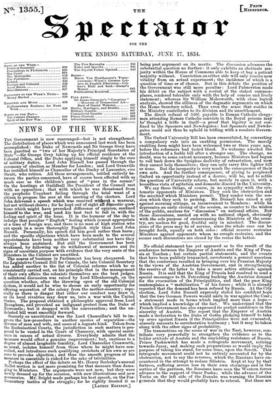NEWS OF THE WEEK.
I
tions which might have provoked difference of opinion, confined himself-to the war, and used his best tact to fall in with the feeling and spirit of the hour. It is the humour of the day to indulge that peculiar "English" feeling which is most appropriate at a time of foreign war, and there is no man of high station who can speak in a more thoroughly English style than Lord John Russell. Personally, his speech did him good rather than harm ; and the specific objections which have been made to the several appointments have been neither very substantial nor have they always been sustained. But still the Government has been weakened, by following up its withdrawal of measures and its signs of uncertain purpose with evidence that the very seats of the Ministers in the Cabinet are unsettled.
The course of business in Parliament has been chequered. In
the legislative Council Bill for Canada, the late Colonial Secretary has added another to the list of Colonial reforms which he so consistently carried out, on his principle that in the management of their own affairs the colonists themselves are the best judges. A collateral discussion was raised by Lord Ellenborough, on the question whether, after the throwing open of the old Colonial system, it would not be wise to choose an early opportunity for offering separation of the colony from the mother-country; espe- cially as there is danger that either our conduct may draw it, or its local rivalries may draw us, into a war with the United States. The proposal obtained a philosophic approval from Lord Brougham, and provoked an indignant protest from the Duke of Newcastle ; but it dropped with the conversation; and the un- debated bill went smoothly forward.
Scarcely so uncriticized was the Lord Chancellor's bill to im-
prove the law-procedure in another species of separation—the divorce of man and wife, and cases of a cognate kind. Taken from the Ecclesiastical Courts, the jurisdiction in such matters is pro- posed to be vested in the Court of Chancery, with special assist- ance in causes of actual divorce. Everybody admits that the measure would effect a genuine improvement ; but, cautious to a degree of almost laughable timidity, Lord Chancellor Cranworth, as usual, isolates himself from those whom he might have con- sulted, and introduces such qualifying crotchets of his own as are sure to provoke objection ; and thus the smooth progress of his measure in essentials is risked for the sake of trivialities.
Perhaps the effect of the debate on Mr. Henry Berkeley's annual Ballot motion is not more promising for that measure than dama- ging to Ministers. The arguments were not new, but they were newly dressed up for the occasion, with new illustrations and new accessories. Mr. Bright made perhaps his best speech, on the Par- liamentary tactics of the struggle; for he rightly treated it as being past argument on its merits. The discussion advances the substantial question no further : it only exhibits an obstinate ma- jority within the House of Commons able to keep at bay a patient majority without. Conviction on either side will only receive new vitality from an actual experiment ; the incidence of which is a question of time or of chance. But in this debate the position of the Government was still more peculiar : Lord Palmerston made his &belt on the subject with a recital of the stalest common- places, rendered tolerable only with the help of concise and lively statement; whereas Sir William Molesworth, with close logical analysis, showed the silliness of the dogmatic arguments on which the Home Secretary relied. Thus even the sense that resides in the Ministry contributes to its division and its unsettlement. The direct refusal of 550/. payable to Roman Catholic clergy- men attending Roman Catholic convicts in the Royal prisons may be' thought a trifle in itself—a proof that bigotry is not con- fined to the Spooners and Newdegates : but Spooners and Newde- gates could not thus be upheld in trifling with a resolute Govern- ment.
The Oxford University Bill has been emasculated, by converting a compulsory rule into an enabling permission. The merely enabling form might have been welcomed two or three years ago, before the reformers had tasted blood. No welcome awaited the introduction of a feeble bill after a stronger one. The change, no doubt, was to some extent necessary, because Ministers had begun to roll back down the Sysiphus declivity of retractation, and now they cannot help themselves ; they can only carry this lighter bill or none. But the incapacity is very much the consequence of their own acts. And the further consequence, of giving to perplexed Oxford an opportunity instead of a decree, will be, not to settle the question of University reform, but merely to open it, with a boundless vista of agitation and domestic discord in the University.
We say these things, of course, in no sympathy with the sys- tematic opponents of Ministers. They seek the obstruction and the mischief which Ministers permit. They render vain the ses- sion which they seek to prolong. Mr. Disraeli has raised a cry against morning sittings, as inconvenient to Members ; while he deprecates an early closing of the session, as counter to the wishes of the public, anxious for "discussion" on national affairs. But those discussions, carried on with no national object, obviously with the sole purpose of embarrassing the Ministers of the coun- try, are useless for good, fruitful only in mischief. The discus- sions of the press may be of service, since the whole case can be brought forth, equally on both sides : official reserve restrains Ministers against opponents whom no scruple restrains, and the sooner such discussions are closed by the recess the better.


























